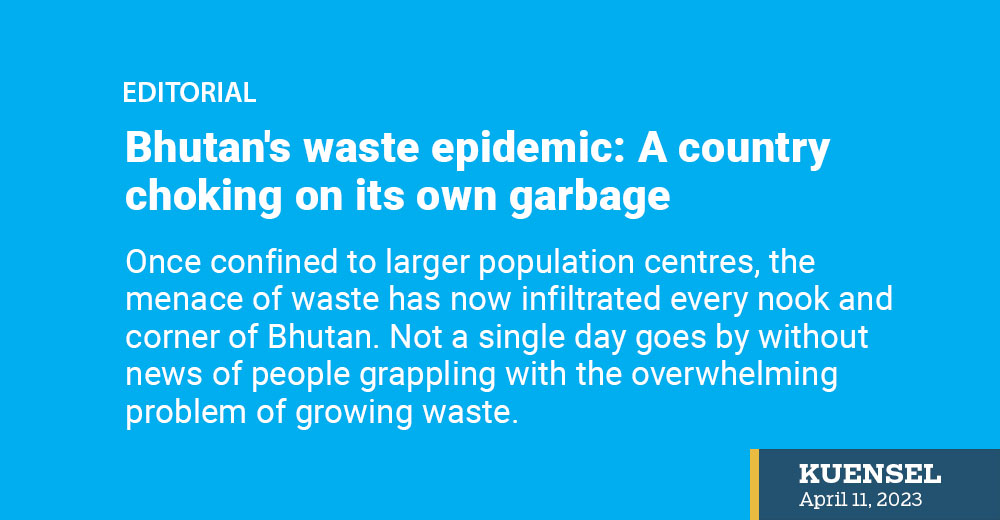Once confined to larger population centres, the menace of waste has now infiltrated every nook and corner of Bhutan. Not a single day goes by without news of people grappling with the overwhelming problem of growing waste. It is a crisis that demands immediate attention; we can no longer turn a blind eye to the country choking on its own garbage.
Bhutan, renowned for its breathtaking beauty and pristine landscapes, is rapidly losing its charm as waste engulfs our villages, towns, and cities. This escalating problem is tarnishing our reputation as an environmentally conscious nation. We can no longer rely on mere rhetoric and must confront the stark reality that our waste management systems are woefully inadequate.
The surge in population, economic development, and consumerism has fueled an alarming increase in waste generation. Mountains of trash now plague our streets, pollute our rivers, and mar the serenity of our once-pristine landscapes. It is a grotesque spectacle that not only defiles our surroundings but also poses grave risks to public health and the environment.
The time has come for the government to shed its complacency and take decisive action. We need a comprehensive waste management strategy that tackles this crisis head-on. Mere lip service and piecemeal efforts will no longer suffice. We require strong leadership and concrete measures to salvage our nation from this quagmire of filth.
First and foremost, we must invest in robust waste management infrastructure that can handle the staggering amount of waste generated daily. We cannot afford to be plagued by outdated systems and insufficient resources any longer. It is high time we modernise our waste collection, processing, and disposal methods to ensure a cleaner and healthier environment for all.
Furthermore, we must instill a sense of responsibility in every Bhutanese citizen. Waste reduction and proper disposal should be ingrained in our collective conscience. The government must launch extensive education and awareness campaigns, ensuring that every individual understands the gravity of the situation and their role in combating this crisis. Ignorance and apathy can no longer be tolerated.
Harsh penalties should be imposed on those who continue to litter and desecrate our precious land. We must send a clear message that such actions will not be tolerated in a country that prides itself on its pristine natural beauty. Simultaneously, incentives should be provided to encourage and reward those who actively participate in waste reduction initiatives. Let us unleash the power of positive reinforcement and inspire a movement for change.
Collaboration between the government, private sector, and local communities is crucial. We must foster a culture of cooperation and shared responsibility. The private sector can play a pivotal role by investing in innovative waste management technologies and establishing recycling and composting facilities. Local communities must take ownership of their surroundings and actively participate in waste segregation and recycling programs.
Bhutan stands at a crossroads. We can either continue down the path of destruction, drowning in our own garbage, or we can rise to the occasion and reclaim our nation from this waste epidemic. Let us not squander our precious heritage and the natural wonders that define us. It is time for resolute action, bold decisions, and a commitment to a cleaner, greener future for Bhutan.
The clock is ticking. Let us unite in the face of this crisis and leave no stone unturned in our pursuit of a waste-free Bhutan. The time for change is now.


